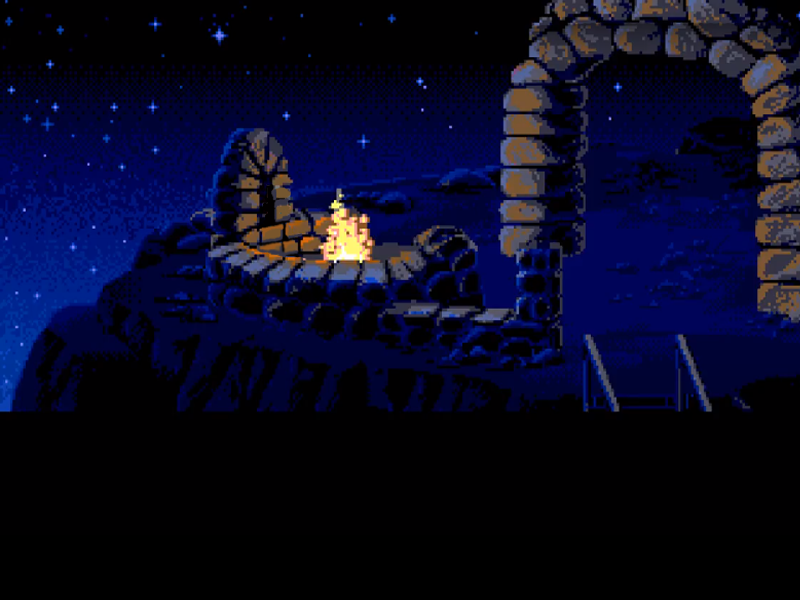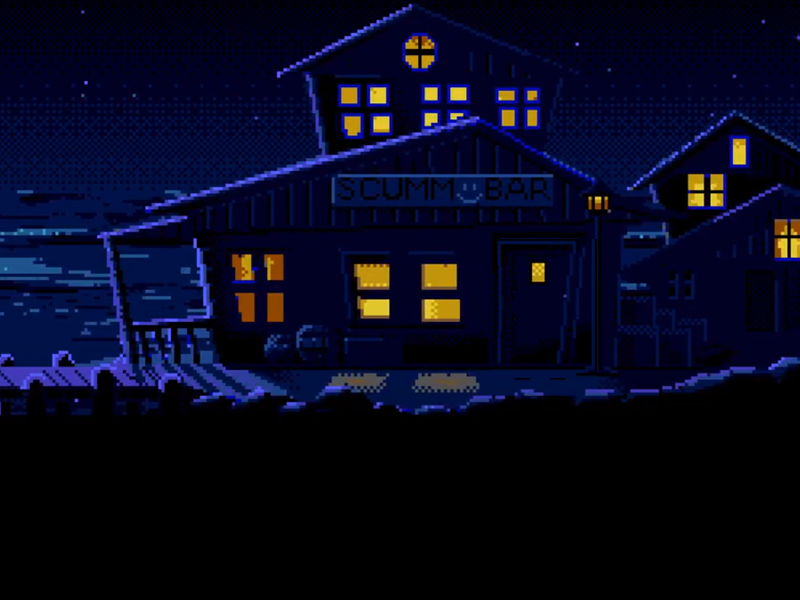monkeyisland
Attribution
Make a Monkey Island-style adventure, pages 56-57, by Mark Vanstone.
Licensed under Creative Commons Attribution-NonCommercial-ShareAlike 3.0 Unported.
Original Python code
# Monkey Island
import pgzrun
import random
with open('data.txt') as d:
script = d.readlines()
pauseCount = 0
stopped = False
currentScriptLine = 0
sceneBackground = "title"
sceneForeground = ""
currentScene = ""
currentText = ""
currentCharacter = 0
characters = [0,0,0]
mycolours = [(100,240,255),(200,200,200),(240,100,100)]
frame = 0
talkRandom = 0
optionText = ["","",""]
optionAction = ["","",""]
def draw():
screen.blit(sceneBackground,(0,0))
for c in characters:
if c != 0:
if (frame/(5+talkRandom))%10 < 5 and c.talking == True:
c.image = c.imagename + "talk"
else: c.image = c.imagename
c.draw()
if sceneForeground != "": screen.blit(sceneForeground,(0,0))
cc = characters[currentCharacter]
if currentText != "": screen.draw.text(currentText, center = (cc.x,cc.y-100), owidth=0.5, ocolor=(0,0,0), color=mycolours[currentCharacter] , fontsize=30)
for o in range(0, 3): screen.draw.text(optionText[o], center = (400,450+(o*40)), color=(255,255,255) , fontsize=30)
def update():
global pauseCount, frame, talkRandom, currentText
while pauseCount == 0 and stopped == False:
processScriptLine()
if pauseCount > 0: pauseCount -= 1
if pauseCount == 0: currentText = ""
if pauseCount < 15 and characters[currentCharacter] != 0:
characters[currentCharacter].talking = False
frame += 1
if frame%30 == 0: talkRandom = random.randint(0, 2)
def processScriptLine():
global script, currentScriptLine, pauseCount, stopped, sceneBackground, currentScene, sceneForeground, currentText, currentCharacter
sl = script[currentScriptLine].split(":")
if sl[0] == "Background": sceneBackground = sl[1].strip('\n')
if sl[0] == "Foreground": sceneForeground = sl[1].strip('\n')
elif sl[0] == "Pause": pauseCount = int(sl[1].strip('\n'))*30
elif sl[0] == "Scene": currentScene = sl[1].strip('\n')
elif sl[0] == "Character":
cl = sl[2].split(",")
setCharacter(int(sl[1]),cl[0],int(cl[1]),int(cl[2]))
elif sl[0] == "Speech":
currentCharacter = int(sl[1])
currentText = sl[2].strip('\n')
characters[currentCharacter].talking = True
elif sl[0] == "SetOption":
optionAction[int(sl[1])] = sl[2]
optionText[int(sl[1])] = sl[3]
elif sl[0] == "Stop": stopped = True
currentScriptLine += 1
def setScene(scene):
global optionText, optionAction, sceneForeground, currentScriptLine, stopped, currentText, currentCharacter, characters
optionText = ["","",""]
optionAction = ["","",""]
currentText = ""
currentCharacter = 0
characters = [0,0,0]
sceneForeground = ""
line = 0
for s in script:
if s.strip('\n') == "Scene:"+scene:
currentScriptLine = line
stopped = False
line += 1
def on_mouse_down(pos):
for o in range(0, 3):
if pos[1] > 450+(o*40)-15 and pos[1] < 450+(o*40)+15 and optionAction[o] != "":
setScene(optionAction[o])
def setCharacter(cnum,cname,cx,cy):
characters[cnum] = Actor(cname, center=(cx, cy))
characters[cnum].imagename = cname
characters[cnum].talking = False
pgzrun.go()














